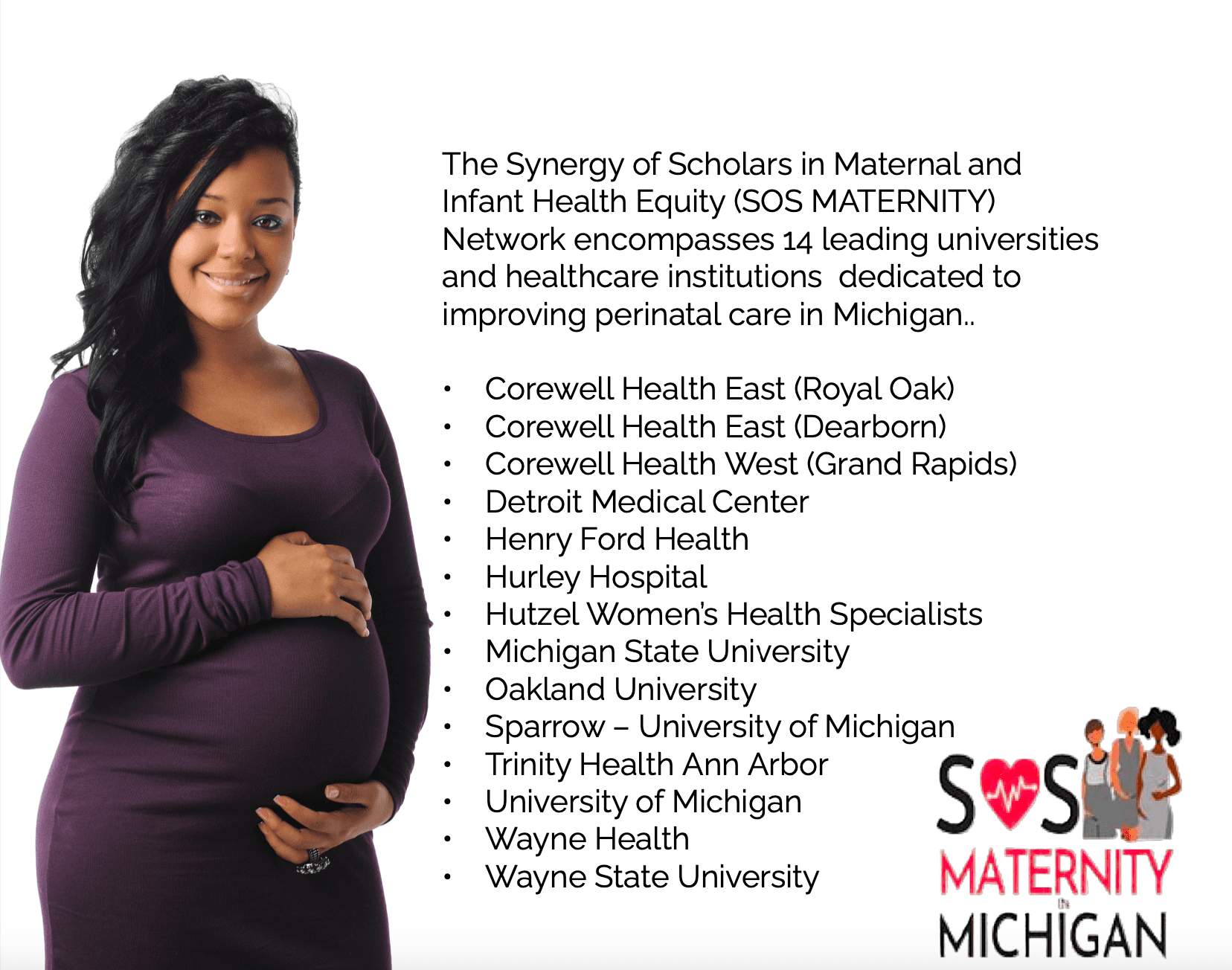By TNCPNEWS
LANSING, MI – An excited and diverse group of policymakers and medical experts convened on November 21, 2024, at the University of Michigan Health – Sparrow Hospital (UM Health Sparrow) to discuss a critical public health issue: promoting healthy pregnancies and the SOS Maternity Network. The atmosphere was charged with a sense of purpose while recognizing the profound impact of maternal health on families, communities, and future generations.
The SOS Maternity Network is run by specialists in high risk pregnancies and obstetrics from 14 leading universities and hospital systems across Michigan. This new model of delivery of perinatal care will address these alarming statistics and discuss why there should be a more rigorous evaluation led by Wayne State University’s Office of Women’s Health.
Michigan is hoping to decrease the number of women and infants who are dying from preventable medical issues. Along with initiatives like SOS Maternity Network, Michigan is seeing an increase in certified birth workers, particularly Black birth workers, who bring culturally responsive care and lived experience to their practices. Certified doulas, midwives, and lactation consultants who share cultural and racial identities with their communities can help bridge communication gaps, provide critical advocacy, and build trust in healthcare systems.
According to the United Nations Population Fund (UNFPA), every two minutes a woman dies of pregnancy or childbirth worldwide.
It’s important to note that maternal and infant mortality rates can vary significantly by race and ethnicity. According to the Advancing Healthy Births Plan 2024 to 2028, in Michigan, Black non-Hispanic infants are three times more likely to die before their first birthday compared to White non-Hispanic infants.
Additionally, between 2015 and 2019, Black women were 2.8 times more likely to die from pregnancy-related causes than their White counterparts.
In 2022, Michigan’s infant mortality rate was 6.4 deaths per 1,000 live births, higher than the national rate of 5.6. Regarding maternal mortality, between 2018 and 2022, Michigan had a rate of 19.1 deaths per 100,000 live births, compared to the national rate of 23.2 during the same period.
Michigan introduces the SOS model to combat maternal and infant mortality
According to information provided at the press conference in November, this is a groundbreaking effort to address Michigan’s maternal and infant health disparities, the state has introduced a new SOS model—a program in its infancy but with immense potential to transform healthcare outcomes for mothers and babies. The model, designed to tackle the root causes of maternal and newborn deaths, revolves around three critical components.
Standardizing Best Practices
A cornerstone of the SOS model is the implementation of standardized best practices among Michigan physicians. This uniform approach focuses on preventing preeclampsia and preterm birth, the two primary causes of maternal and newborn mortality. By adopting evidence-based guidelines, the program ensures that pregnant individuals across the state receive consistent, high-quality care.
Expanding Access to Prenatal Care
Recognizing that access to prenatal care is a significant barrier for many, the SOS model emphasizes removing these obstacles through innovative solutions. The program provides transportation services for pregnant individuals and assigns patient navigators to offer personalized guidance throughout their pregnancies. These navigators help patients navigate the complexities of the healthcare system, ensuring timely and effective care.
Incentivizing Healthy Pregnancies
Another novel aspect of the SOS model is its focus on incentivizing healthy pregnancy behaviors. This system encourages expectant mothers to prioritize their health by offering rewards for practices that contribute to healthier pregnancies. While details of the incentives are still emerging, the goal is to empower mothers to take proactive steps toward better health outcomes for themselves and their babies.
A Promising Start
Though still in its early stages, the SOS model represents a bold step forward in addressing the critical issues of maternal and infant mortality in Michigan. The program’s emphasis on prevention, accessibility, and incentives underscores a commitment to creating systemic change. As it evolves, the SOS model has the potential to serve as a blueprint for other states grappling with similar health disparities.
With its innovative approach, the SOS model is poised to bring about meaningful improvements in maternal and infant health outcomes, paving the way for a healthier future for Michigan families.
SOS Maternity Network program was created to reduce maternal and infant mortality. The state has allocated $11 million to fund this state-wide network.
UM Health Sparrow is the only mid-Michigan health system participating in the SOS Maternity Network.
Publisher’s note: TNCPNEWS found one person who referred a client to SOS for services but could not follow up because the program is so new and there is a process to apply for services. However, we will be following this program because it should be able to turn the tide of maternal and infant deaths in Michigan.
To inquire about becoming a SOS Mom. Log on here: https://bit.ly/4iZDHXX.
The Synergy of Scholars in Maternal and Infant Health Equity (SOS MATERNITY) Network encompasses 14 leading universities and healthcare institutions dedicated to improving perinatal care in Michigan..
• Corewell Health East (Royal Oak)
• Corewell Health East (Dearborn)
• Corewell Health West (Grand Rapids)
• Detroit Medical Center
• Henry Ford Health
• Hurley Hospital
• Hutzel Women’s Health Specialists
• Michigan State University
• Oakland University
• Sparrow – University of Michigan
• Trinity Health Ann Arbor
• University of Michigan
• Wayne Health
• Wayne State University




